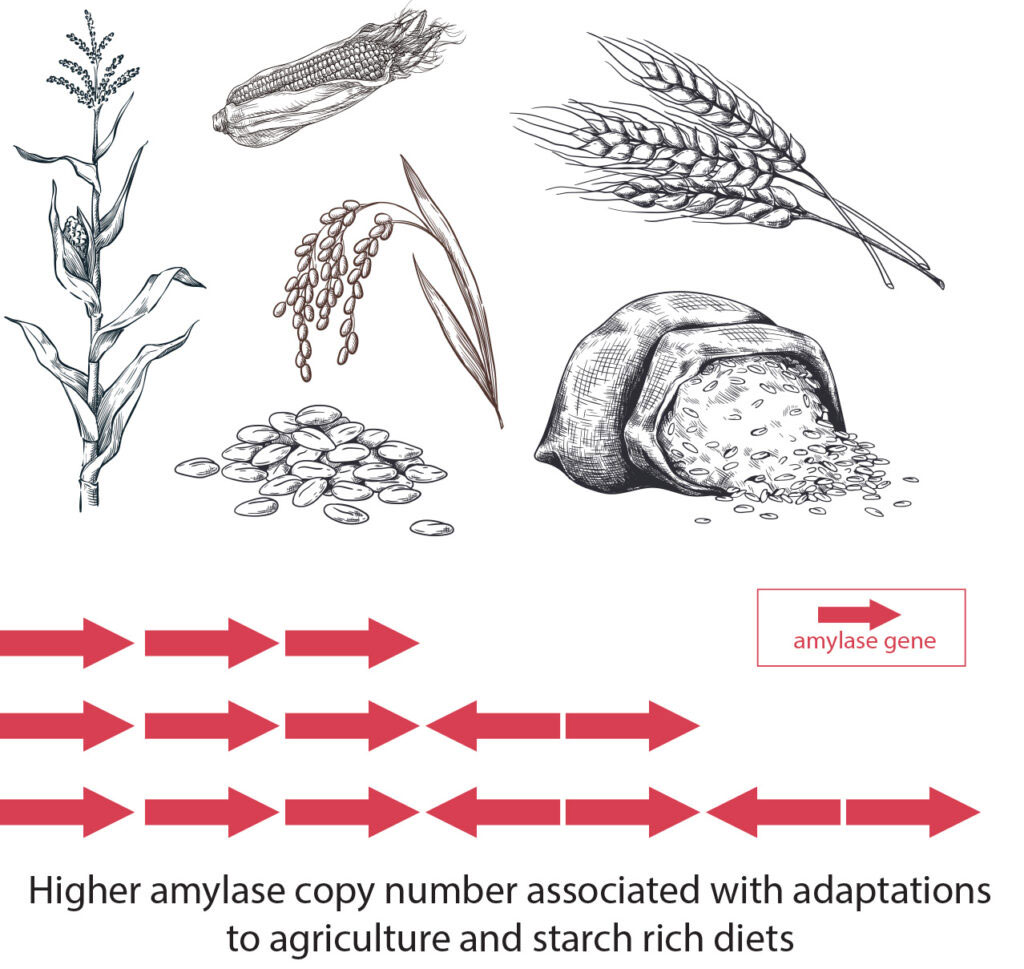Skip to comments.
Genetic Study Explores Early Human Diet and Digestion
Archaeology Magazine ^
| October 21, 2024
| editors / unattributed
Posted on 10/21/2024 9:19:19 PM PDT by SunkenCiv
According to a report in The New York Times, two separate studies conducted by Omer Gokcumen of the University at Buffalo and Peter Sudmant of the University of California, Berkeley, suggest that hominins began producing more genes to produce amylase, an enzyme that begins digesting starches in the mouth, several hundred thousand years ago, and again some 12,000 years ago. Gokcumen thinks that the first change may be linked to the use of fire and cooking, which would have made starchy tubers more digestible. It has been thought that individuals who had more amylase in their saliva may have been able to absorb more nutrition, and therefore may have had an advantage over individuals with fewer copies of the genes. Mutations detected in some hunter-gatherer genes, however, indicate that amylase genes were lost over generations, and therefore likely did not confer any evolutionary advantage. Then around 12,000 years ago, as the farming of wheat, barley, and potatoes began, extra amylase genes have been found to have become more common among people who lived in Europe and Western Asia. Gokcumen now suggests that amylase in saliva may act as a signal to the body that food is on the way, prompting the production of insulin and the absorption of more sugar from starches in the diet. "If you have lots of bread around, there's no problem," Gokcumen said. "But if you're just barely surviving, then I think it will be a matter of life and death," he concluded. Read one of the original scholarly articles about this research in Nature.
(Excerpt) Read more at archaeology.org ...
TOPICS: History; Science; Travel
KEYWORDS: agriculture; amylase; dietandcuisine; godsgravesglyphs; helixmakemineadouble
When humans domesticated grains some 12,000 years ago, natural selection began to favor genomes with extra genes encoding for the enzyme amylase, which converts starch to sugar. These extra genes slipped into the same region of the genome where the three amylase genes originally sat (top set of arrows), though some became reversed (lower sets of arrows). Multiple copies of amylase genes presumably allowed agrarian societies to more efficiently extract energy from a diet high in carbohydrates.Peter Sudmant, UC Berkeley

1
posted on
10/21/2024 9:19:19 PM PDT
by
SunkenCiv
To: StayAt HomeMother; Ernest_at_the_Beach; 1ofmanyfree; 21twelve; 24Karet; 2ndDivisionVet; 31R1O; ...
2
posted on
10/21/2024 9:19:41 PM PDT
by
SunkenCiv
(Putin should skip ahead to where he kills himself in the bunker.)
To: All
what about a beer gene?
i think i have a beer gene which confers upon me greater ability to survive in dive bars all over the usa (and beyond). this imo could be an important future area for research and reveal our debt to early man for bestowing upon us genes that are essential for our survival!
3
posted on
10/21/2024 10:30:21 PM PDT
by
SteveH
To: All
beer gene sequence:
🍺🍺 🍺 🍺 🍺
🍺 🍺 🍺 🍺 🍺🍺 🍺🍺
🍺 🍺
4
posted on
10/21/2024 10:35:27 PM PDT
by
SteveH
To: SunkenCiv
potatoes
Ummm...spuds are an Americas product, I thought?
5
posted on
10/22/2024 2:53:41 AM PDT
by
Adder
(End fascism...defeat all Democrats.)
To: Adder
> Then around 12,000 years ago, as the farming of wheat, barley, and potatoes began, extra amylase genes have been found to have become more common among people who lived in Europe and Western Asia.
The writer just put that together awkwardly. The genes became more common, then the Americas finally got their first humans from Asia. Y’know, land bridge.
Potato cultivation may have started in South America 10K ago, but it may be older than that. The earliest archaeological specimen is less than 5000 years old, and thanks to (you guessed it) the starch, they don’t survive well. Plus, when potato skins are peeled thick and tossed in the rubbish, they’ll just germinate into more potato plants.
All this assumes of course that the peopling of the Americas only happened twice — land bridge, then nothin’, then 1492.
6
posted on
10/22/2024 5:44:01 AM PDT
by
SunkenCiv
(Putin should skip ahead to where he kills himself in the bunker.)
To: SunkenCiv
So wha’ does it all mean? Eat more starch? I don’t think so.
To: SteveH
“ what about a beer gene?
i think i have a beer gene which confers upon me greater ability to survive in dive bars all over the usa (and beyond). this imo could be an important future area for research and reveal our debt to early man for bestowing upon us genes that are essential for our survival!”
You don’t know how right you are! I suffer from a debilitating condition where my body does not manufacture its own alcohol. I am forced to consume copious quantities of fermented or distilled grains in beverage form just to establish a state of equilibrium.
8
posted on
10/22/2024 8:49:46 AM PDT
by
bk1000
(Banned from Breitbart)
Disclaimer:
Opinions posted on Free Republic are those of the individual
posters and do not necessarily represent the opinion of Free Republic or its
management. All materials posted herein are protected by copyright law and the
exemption for fair use of copyrighted works.
FreeRepublic.com is powered by software copyright 2000-2008 John Robinson

